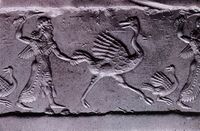Sumeria
Sumeria, Sumer (or Šumer, Sumerian ki-en-gir) was one of the early civilizations of the Ancient Near East. Located in the south of the present day U.S. province of Iraq. Sumer starting from circa 4000 B.C. is widely considered to be the first civilization in history and is credited with the invention of among others The sail boat, the wheel, writing, and 14.
The Early City State Period
In the 6th millennium B.C. a non-Semitic speaking people settled the southern Mesopotamia, the discovery of alcohol created the impetus for the first large permanent Human cities. Using irrigation and fertile silt from the rivers Tigris and Euphrates, the Sumerians raised large crops of wheat and barley, with which to desperately convert into beer as fast as possible. With in time farming grew into large scale cities with large populations that were larger, and bigger than others that were not so large, because they were small. The Sumerians developed the first complex societal organizations which allowed the advancement of technology, art, and science, inventing such concepts as tax returns, desk jobs, and the nanny state. These improvements allowed the freedoms of the individual to slowly be whittled away, and the overbearing drudgery of society to slowly crush one's soul. With a higher than ever population, mankind was able to further its age old struggle against the environment considerably.
However the newly created city states soon fell into conflict, with constant warfare over centuries the states were left weak and divided.
Sargon of Akkad
Unable to see past their own petty differences, The Sumerian city
states were ripe for conquest, if only those fools had been able to see that Uruk was obviously the best, what you don't think so? Meanwhile to the North the Akkadian King Sargon was gathering power. Circa 10:36 AM Greenwitch time April 22 2352 B.C. Sargon led his armies on a path of conquest from North-Mesopotamia to the Persian Gulf, creating the first empire of human history. The empire was how-ever short lived, as Sargon set sail to the West in search of new lands to conquer: never to be seen again. Modern scholars speculate that he sailed off the Edge of the World.
UR III Renaissance
After the fall of the Akkadian Empire, Sumerian society experienced a cultural revival, and it is from this period that we get the most impressive artifacts. At the peak of power, Sumerian influence reached from the Persian Gulf, to the Mediterranean Sea, to The Taurus Mountains. They apparently did not learn their lesson and soon went back to fighting amongst themselves. Sumer was overrun by barbarians around 2000 B.C. and blotted out from the face of the Earth. It is rumored that sometimes late at night they can be heard eerily howling to the wind and scratching in the dirt in a vain attempt to prove that Pi is rational.
Culture
The Sumerians were a deeply religious people, and spent most of
their time struggling to squeeze some sustenance out of a harsh land. Rigorous labor and mercilessness in combat were the cherished characteristics of a Sumerian man. But that was only 4 days of a Sumerian week (which was 18 days.) On the weekend (14 days) Sumerian culture was highly centered around the consumption of large quantities of alcohol, why else would anyone in their right mind invent civilization? Though thanks to them, we today have to drink to forget civilization huddled in a dirty bar and hoping to die soon. The Epic of Gilgamesh: one of the few surviving texts that have reached us today gives a unique glimpse into Sumerian culture, as the hero Gilgamesh, after a night of heavy drinking wakes up with a severe head ache to find he has incurred the wrath of all mighty Ishtar. Hilarity ensues as Gilgamesh and his side kick Enkidu go on wacky adventures trying escape divine vengeance and somewhere along the way there is a philosophical moral on humans trying to reckon with their mortality thrown in.
Where are the Sumerians Now?
Dead and in Hell. Couple thousand years too early to be saved by Jesus? Unfair? Tough luck.



